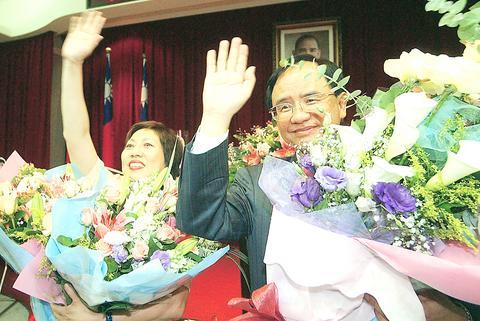Carrying bouquets and blessings from colleagues, outgoing Minister of Economic Affairs Lin Yi-fu (
"I'm very grateful for the efforts of the whole ministry staff ... Without their hard work, we would have not accomplished what we have during the past two years," Lin said.
Lin accepted an offer on Tuesday from Premier Yu Shyi-kun to serve as minister without portfolio, starting today.

PHOTO: LIU HSIN-TEH, TAIPEI TIMES
"I hope to play a role as a good policy-maker in drafting laws, as well as being an efficient coordinator to resolve disputes among government departments," he said of his new job.
Lin, 62, was promoted to minister from vice minister in March 2002. He became the third economic minister during the first four-year term of Chen Shui-bian's (
Lin joined the ministry in 1966. He was trade representative in Australia, the Philippines, Thailand and Toronto, Canada, between 1972 and 1980 before serving in the Bureau of Foreign Trade between 1990 and 2000.
When Lin took up the vacancy left by Tsung, many speculated that he might not last long because he was a party member of the opposition Chinese Nationalist Party (KMT).
But Lin proved that he is not a temporary actor but a minister who would make many major contributions during his tenure.
"I'm glad to see that Taiwan's economic growth has bounced back from rock bottom last year, along with double-digit growth in the export sector and investment, showing that the supporting measures we've laid are working," Lin said yesterday.
On top of improvements in the economy, Lin said he was proud of several major projects he was responsible for, such as the nation's first free-trade agreement (FTA) with Panama, concluded in August last year.
He also oversaw a rise in foreign investment to US$3.58 billion last year, 9.3 percent up from the previous year.
There were also several setbacks, he recalled. These included the nationwide shortage of water in the fall of 2002, a shortage of construction materials in the second half of last year, the urgent need for anti-SARS resources last summer and the soaring prices of raw materials recently.
"With the cooperation of all the staff in the ministry, we've tackled these difficulties one by one, providing us with invaluable memories of working together," Lin said.
Lin said the most unforgettable part of his career was in the ministry's Bureau of Foreign Trade, when he attended more than 250 negotiations, including about 100 related to Taiwan's entry into the WTO.
The intensive meetings and pressure wore Lin out at that time, he said.
"So I always tell people that I'm a man with no guts," he joked.
Lin's experience in trade activities gives him a good understanding of what businesspeople need, so he can come up with well though-out measures that help the business community, said Rock Hsu (
"We appreciated his diligence and contributions to the nation's economy, and hope he continues to do well in the new post," Hsu said.

Nvidia Corp chief executive officer Jensen Huang (黃仁勳) on Monday introduced the company’s latest supercomputer platform, featuring six new chips made by Taiwan Semiconductor Manufacturing Co (TSMC, 台積電), saying that it is now “in full production.” “If Vera Rubin is going to be in time for this year, it must be in production by now, and so, today I can tell you that Vera Rubin is in full production,” Huang said during his keynote speech at CES in Las Vegas. The rollout of six concurrent chips for Vera Rubin — the company’s next-generation artificial intelligence (AI) computing platform — marks a strategic

Enhanced tax credits that have helped reduce the cost of health insurance for the vast majority of US Affordable Care Act enrollees expired on Jan.1, cementing higher health costs for millions of Americans at the start of the new year. Democrats forced a 43-day US government shutdown over the issue. Moderate Republicans called for a solution to save their political aspirations this year. US President Donald Trump floated a way out, only to back off after conservative backlash. In the end, no one’s efforts were enough to save the subsidies before their expiration date. A US House of Representatives vote

REVENUE PERFORMANCE: Cloud and network products, and electronic components saw strong increases, while smart consumer electronics and computing products fell Hon Hai Precision Industry Co (鴻海精密) yesterday posted 26.51 percent quarterly growth in revenue for last quarter to NT$2.6 trillion (US$82.44 billion), the strongest on record for the period and above expectations, but the company forecast a slight revenue dip this quarter due to seasonal factors. On an annual basis, revenue last quarter grew 22.07 percent, the company said. Analysts on average estimated about NT$2.4 trillion increase. Hon Hai, which assembles servers for Nvidia Corp and iPhones for Apple Inc, is expanding its capacity in the US, adding artificial intelligence (AI) server production in Wisconsin and Texas, where it operates established campuses. This

US President Donald Trump on Friday blocked US photonics firm HieFo Corp’s US$3 million acquisition of assets in New Jersey-based aerospace and defense specialist Emcore Corp, citing national security and China-related concerns. In an order released by the White House, Trump said HieFo was “controlled by a citizen of the People’s Republic of China” and that its 2024 acquisition of Emcore’s businesses led the US president to believe that it might “take action that threatens to impair the national security of the United States.” The order did not name the person or detail Trump’s concerns. “The Transaction is hereby prohibited,”